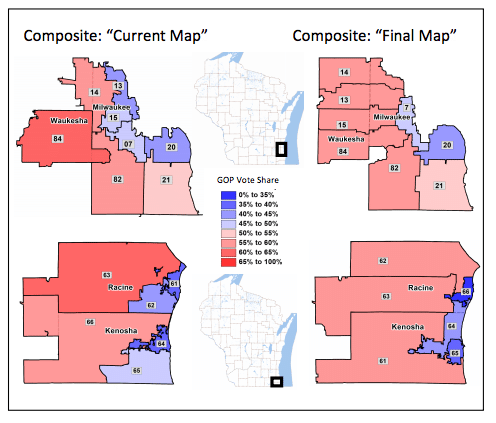Connecting state and local government leaders
Increasingly sophisticated mapping platforms have made redistricting easier—but data could also be the key to untangling the problem.
In 1788, John Adams wrote that the House of Representatives should be an “exact portrait” of the people as a whole. But as district boundaries are increasingly manipulated via partisan gerrymandering, that portrait starts to look like it was painted during Picasso’s cubist phase.
The question of how far mapmakers overstep their boundaries when drawing district lines will get a new test next week in a Supreme Court case that asks whether Wisconsin mapmakers engaged in unlawful partisan line-drawing. The topic has been scrutinized for two centuries, but the case, Gil v. Whitford, is the first in 13 years to reach the Supreme Court. This ruling could be especially influential now because mapmaking tactics have become dramatically more sophisticated. Officials have access to more detailed data than ever before, and are using that data for partisan means with needlepoint precision.
“If you thought the maps drawn in 2010 were bad, just wait,” says says Michael Li, Senior Counsel at NYU’s Brennan Center for Justice. “Because things that look like space age technology now will look run-of-the-mill when things are redrawn in 2021.”
Districts for legislative representatives are drawn based on population, but they also consider other factors, like race. Officials get to redraw these lines with population changes, but they have long used that redrawing as an opportunity to skew districts in favor of their preferred political party. The existence of mapping software like Maptitude, which is often used to re-draw district lines, and the availability of granular census data means that policymakers are now able to leech all kinds of information and use it to their advantage. Because the tools used to manipulate districts have become so precise, what used to be the equivalent of redistricting with a blunt instrument is now “like political laser surgery,” says David Thornburgh, president and CEO of the Committee of Seventy, an organization in Pennsylvania that aims to combat corruption.
“The software has advanced to the point where it can be done very methodically, writing the code that sets the goal of having the most wasted votes,” says Bernie Langer, a Senior Data Analyst at PolicyMap, a site that provides mapping data for public use. “Because of all of the polarization that’s going on, it’s a lot easier than it used to be to guess who an individual person would vote for based on their demographic and income status. You don’t need to find out what the individual voting records are—you can just use census data to look where there are people of certain races, income, educational attainment. That data is so granular it can be down to a census block group, and the software can efficiently make these gerrymandered districts.”
Redrawing districts along partisan lines can create a disconnect between official actions and voters’ beliefs. In a recent report, the Center for American Progress lays out the effects of gerrymandering in six different states, where laws enacted by elected officials work against progressive causes—even when voters support them. In North Carolina, where 64 percent of residents support LGBT nondiscrimination laws, the state legislature passed a bill to effectively quash local governments’ authority to extend civil rights protection to the LGBT community. In Virginia, 69 percent of voters support the ACA’s expansion of Medicaid, but the state legislature still rejected any expansion. In Rhode Island, one of the few recent examples of Democrats being responsible for gerrymandering, the state legislature raised the gas tax over residents’ objections. When Wisconsin’s district maps were redrafted in 2011, the creators explicitly acknowledged that they were basing the borders on demographic data by labelling map file names according to how favorably partisan they were. The result shifted the balance of power: Republicans won 60 out of 90 seats in the state assembly, even though they lost the popular vote.
The Campaign Legal Center, which is representing the plaintiffs in the Wisconsin case, is trying to establish a standard for proving that partisan gerrymandering has occurred. That standard would employ a three-part test: first establishing that a district was drawn with discriminatory intent, then proving that the re-districting affected election outcomes, and, lastly, evincing that the state could have done a better job at drawing balanced districts.
Here, technology can be used for more than ill-gotten gains. As much as map-making tools are aiding the process of gerrymandering, they’re also allowing advocates a way to track when it’s happening—and to fight back. Ruth Greenwood, Senior Legal Counsel at the Campaign Legal Center, recalls a case in Texas near the Rio Grande where plaintiffs proved that policymakers had used data on Latino turnout in a district to carefully include neighborhoods and homes that didn’t vote and exclude those that did. Greenwood is hoping that the courts will use the same data mapmakers do to identify and untie partisan knots. “Technology and data have changed the game,” Greenwood says. “What we are doing is saying, ‘Let’s not use all of that tech for evil, let’s let the courts use it for good.’”

Jowei Chen, an Assistant Professor at the University of Michigan, has already been using technology to help courts navigate the judgement process. Using algorithms, Chen plugs in a state’s redistricting criteria and produces thousands of alternative maps to see if it would be possible to draw districts less partisan than the ones created by a state’s legislature. In the Wisconsin case, for example, Chen’s maps show that the assembly’s maps were not as compact as they could have been and says he found, “that it is easier to do much better.”
Chen notes, however, that there are pitfalls in relying on technology alone to preserve democracy. “Algorithms are only as good as the districting criteria we tell them to follow,” he says.
Meanwhile, Project Seventy is trying to crowdsource better and more equitable districts through their new initiative, Draw the Line, which invites ordinary people to draw legislative maps. “This is an open source demonstration of what we think should be a basic opportunity of citizenship: that you get to think through how you get to be represented,” says Thornburgh. Their goal is to engage 10,000 Pennsylvania residents in drawing maps. They may well reach it: At one meeting put on by Fair Districts Pennsylvania, a group that works to stop gerrymandering, 15,000 people showed up to learn about the issue.
“Against all odds and conventional wisdom,” Thornburgh says, “this obscure process has lit a fire in people.”
Teresa Matthew is an editorial fellow at CityLab, where this article was originally published.

NEXT STORY: What’s Procurement Got to Do With IT?



